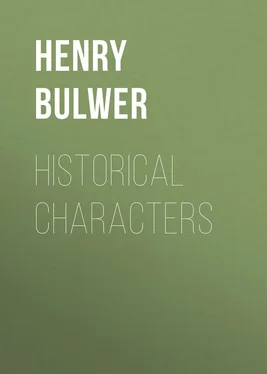Henry Bulwer - Historical Characters
Здесь есть возможность читать онлайн «Henry Bulwer - Historical Characters» — ознакомительный отрывок электронной книги совершенно бесплатно, а после прочтения отрывка купить полную версию. В некоторых случаях можно слушать аудио, скачать через торрент в формате fb2 и присутствует краткое содержание. Жанр: foreign_antique, foreign_prose, на английском языке. Описание произведения, (предисловие) а так же отзывы посетителей доступны на портале библиотеки ЛибКат.
- Название:Historical Characters
- Автор:
- Жанр:
- Год:неизвестен
- ISBN:нет данных
- Рейтинг книги:3 / 5. Голосов: 1
-
Избранное:Добавить в избранное
- Отзывы:
-
Ваша оценка:
- 60
- 1
- 2
- 3
- 4
- 5
Historical Characters: краткое содержание, описание и аннотация
Предлагаем к чтению аннотацию, описание, краткое содержание или предисловие (зависит от того, что написал сам автор книги «Historical Characters»). Если вы не нашли необходимую информацию о книге — напишите в комментариях, мы постараемся отыскать её.
Historical Characters — читать онлайн ознакомительный отрывок
Ниже представлен текст книги, разбитый по страницам. Система сохранения места последней прочитанной страницы, позволяет с удобством читать онлайн бесплатно книгу «Historical Characters», без необходимости каждый раз заново искать на чём Вы остановились. Поставьте закладку, и сможете в любой момент перейти на страницу, на которой закончили чтение.
Интервал:
Закладка:
Comte de Beugnot, in his memoirs recently published, speaks thus of these transactions: 55
“The Prince de Benevent was acquainted, in all its details, with what had passed (at Bayonne). He appeared indignant. ‘Victories,’ he said, ‘do not suffice to efface such things as these, because there is something in them which it is impossible to describe, that is vile, deceitful, cheating! I cannot tell what will happen, but you will see that no one will pardon him (the Emperor) for this.’ The Duc Decrès, indeed,” M. de Beugnot continues, “has told me more than once that the Emperor had in his presence reproached M. de Talleyrand for having counselled what took place at Bayonne, without M. de Talleyrand seeking to excuse himself. This has always astonished me. It is sufficient to have known M. de Talleyrand to be sure that, if he had been favourable to dispossessing the princes of the House of Bourbon of the Spanish throne, he would not have resorted to the means that were employed. Besides, when he spoke to me, it was with a sort of passion that he never displayed but on subjects which strongly excited him.”
There can be no doubt, indeed, that what took place as to Spain was a subject of great difference between M. de Talleyrand and Napoleon. M. de Talleyrand would never afterwards during the reign of Louis XVIII. have publicly affirmed this, surrounded as he was by contemporaries and enemies, if it had not been true. Moreover, the general voice of the time, which is more in such cases to be trusted than any individual testimony, loudly proclaimed it; and as to not answering Napoleon when he was pouring forth in violent and insulting language the accusations which he sometimes levelled at those who displeased him, it is well known that M. de Talleyrand never replied to such attacks but by an impassible face and a dignified silence.
Nor were the affairs of the Peninsula the only ones on which M. de Talleyrand and the Emperor at this time disagreed. The French troops entered Rome and Spain (for Napoleon was now for despoiling the Pope as a prince, after courting him as a Pontiff) about the same epoch; and the Prince of Benevent was as opposed to one violence as to the other.
It was not, however, out of this affair, or that affair in particular, that the enmity between the emperor and his former minister – an enmity so important in the history of both – took its rise.
M. de Talleyrand, the Empire once established and fortunate, had attached himself to it with a sort of enthusiasm. The poesy of victory, and the eloquence of an exalted imagination, subdued for a time the usual nonchalance and moderation of his character. He entered into all Napoleon’s plans for reconstituting “An Empire of the Francs,” and reviving the system of fiefs and feudal dignitaries; by which it is, however, true, that the followers and favourites of the conqueror had nothing to lose. “Any other system,” he said, “but a military one, is in our circumstances at present impossible. I am, then, for making that system splendid, and compensating France for her liberty by her grandeur.”
The principality he enjoyed, though it by no means satisfied him, was a link between him and the policy under which he held it. He wished to keep it, and to safeguard the prosperity of a man, whose adversity would cause him to lose it. But he had a strong instinct for the practical; all governments, according to his theory, might be made good, except an impossible one. A government depending on constant success in difficult undertakings, at home and abroad, was, according to his notions, impossible. This idea, after the Peace of Tilsit, more or less haunted him. It made him, in spite of himself, bitter against his chief – bitter at first, more because he liked him than because he disliked him. He would still have aided to save the Empire, but he was irritated because he thought he saw the Empire drifting into a system which would not admit of its being saved. A sentiment of this kind, however, is as little likely to be pardoned by one who is accustomed to consider that his will must be law, as a sentiment of a more hostile nature.
Napoleon began little by little to hate the man for whom he had felt at one time a predilection, and if he disliked any one, he did that which it is most dangerous to do, and most useless; that is, he wounded his pride without diminishing his importance. It is true that M. de Talleyrand never gave any visible sign of being irritated. But few, whatever the philosophy with which they forgive an injury, pardon a humiliation; and thus, stronger and stronger grew by degrees that mutual dissatisfaction which the one vented at times in furious reproaches, and the other disguised under a studiously respectful indifference.
This carelessness as to the feelings of those whom it would have been wiser not to offend, was one of the most fatal errors of the conqueror, who could not learn to subdue his own passions: but he had become at this time equally indifferent to the hatred and affection of his adherents; and, under the ordinary conviction of persons over-satisfied with themselves, fancied that everything depended on his own merits, and nothing on the merits of his agents. The victory of Wagram, and the marriage with Marie Louise, commenced, indeed, a new era in his history. Fouché was dismissed, though not without meriting a reprimand for his intrigues; and Talleyrand fell into unequivocal disgrace, in some degree provoked by his witticisms; whilst round these two men gathered a quiet and observant opposition, descending with the clever adventurer to the lowest classes, and ascending with the dissatisfied noble to the highest.
The scion of the princely house of Périgord was, indeed, from his birth, quite as much as from his position in the Empire, at the head of the discontented of the aristocracy; M. de Talleyrand’s house then (the only place, perhaps, open to all persons, where the government of the day was treated without reserve) became a sort of “rendezvous” for a circle which replied to a victory by a bon mot , and confronted the borrowed ceremonies of a new court by the natural graces and acknowledged fashions of an old one. All who remember society at this time, will remember that the ex-minister was the sole person who had a sort of existence and reputation, separate and distinct from the chief of the State, whose policy he now affected to consider, and probably did consider, as verging towards the passion of a desperate gambler, who would continue to tempt Fortune until she grew wearied and deserted him.
Nor did the Austrian alliance, which the Emperor had lately formed, meet with M. de Talleyrand’s approval, although he had at one period advised it, and been also mixed up in the question of a marriage with the imperial family of Russia. This change might have proceeded from his now seeing that such an union as he had at one time favoured, in the hope that it would calm the restless energy of Napoleon, would only stimulate his ambition: or it might have been because, having had nothing to do with the resolutions adopted at Vienna, he had gained nothing by them. At all events, what he said with apparent sincerity, was – “Nothing is ever got by a policy which you merely carry out by halves.” “If the Emperor wants an alliance with Austria, he should satisfy Austria: does he think that the House of Hapsburg considers it an honour to ally itself with the House of Bonaparte? What the Emperor of Austria desires, is to have his provinces restored, and his empire raised and revived: if the government of France does not do this, it disappoints him; and the worst enemies we can have are those we disappoint.”
These sentiments, however, found as yet no echo out of the circle of a few independent and enlightened politicians.
Читать дальшеИнтервал:
Закладка:
Похожие книги на «Historical Characters»
Представляем Вашему вниманию похожие книги на «Historical Characters» списком для выбора. Мы отобрали схожую по названию и смыслу литературу в надежде предоставить читателям больше вариантов отыскать новые, интересные, ещё непрочитанные произведения.
Обсуждение, отзывы о книге «Historical Characters» и просто собственные мнения читателей. Оставьте ваши комментарии, напишите, что Вы думаете о произведении, его смысле или главных героях. Укажите что конкретно понравилось, а что нет, и почему Вы так считаете.












